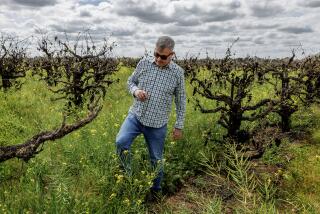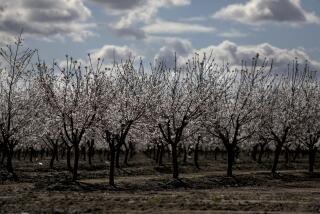Farmers Markets: Raisins, outside the box
REEDLEY, Calif. -- Raisins are the neglected icon of California agriculture, perceived as an old-fashioned industrial commodity, devoid of seasonal sizzle. At farmers markets, however, it’s well worth searching out special varieties, freshly harvested and processed by small growers.
One of the top grape vendors at local farmers markets, Linda and Brian Raphael of Apkarian Family Farm, produce high-quality raisins in small quantities, and they show up personally to sell them. On Monday, in anticipation of rain, they were pulling in the last of their trays from the drying yard in Reedley, in Fresno County, where almost three-quarters of the state’s raisin crop is produced. Raisins take two to three weeks to dry, they explained, depending on the size of the grape and the time of year, and are typically flipped over after two weeks.
Raisins are very dry and tough when they come off the trays, but after being dumped into bins they are sent off to a processor that removes the stems and washes the raisins, leaving them pleasingly moist and plump. The Raphaels don’t use commercial treatments such as lye or sulfur, which is used to let golden raisins keep their color, or mineral oil to keep the fruits from clumping.
The varieties they dry include Thompson Seedless, the standard for the last century, and two seedless muscats: Diamond Muscat, their favorite, small and richly flavored; and Princess, which is large and very sweet, with concentrated muscat flavor.
The sweetest, most highly flavored of all, the seeded Muscat of Alexandria, dominated California raisin production in the 19th century but is now nearly extinct. This year, in response to numerous requests, the Raphaels have prepared 200 pounds, which they will sell by mail order only.
“Muscat of Alexandria buyers want a sticky raisin to cut up in their breads, as called for in old recipes,” said Linda Raphael. “They like the crunch of the seeds, which become softer when dried.”
Raisins can keep for a month at room temperature but store better in the refrigerator, and for longer periods, in the freezer. Raisins get slightly milder in flavor and drier when they’re older, said Brian, although there’s not a huge difference between the old and the new crop. The Raphaels are just finishing with their old-crop raisins and will start bringing the new in the next week to the Pasadena and Ventura markets on Saturdays, Santa Clarita on Sundays and Thousand Oaks on Thursdays.
The farm was established in the 1940s by Vartan Apkarian, one of many local grape growers of Armenian heritage. He and his wife, Betty, were joined in the business by their son Don, who married a banker, Linda Caplener, in 1988. Vartan died of a heart attack at the Santa Clarita market in 1995, and the next year Linda quit her bank job and moved to the farm with Don. They cultivated 40 acres, half of them grapes and the rest mostly stone fruit. But in 1999, Don died at age 50, leaving Linda, whose knowledge of farming was limited, bereft in the middle of harvest.
“It was September, and I still had grapes on the vines,” she recalled. “It was kind of a lifesaver for me, because I couldn’t stop and dwell on everything. I had to keep going.”
Vartan and Don had put in a test plot of experimental selections bred by David Ramming of the U.S. Department of Agriculture, and Ramming and his assistants helped teach Linda how to farm. She also met Brian Raphael, a divorced Reedley native who had farmed raisins in Selma and had done some work for Don. He started helping her sell at farmers markets, and they got to know each other on the 3½-hour ride to and from the Southland. One thing led to another, and on Oct. 1 they celebrated their 11th anniversary with lunch and a movie in Fresno.
The Raphaels grow 25 grape varieties, which they pick from early July to late October, or as late as they can before heavy rains end the harvest. Many late-season grapes have a thicker skin and firmer texture, which enables them to withstand autumn rains and keep in storage.
Autumn Royal, introduced by the USDA in 1996, is the leading late black grape in California, and for the Raphaels. Large, oval and purplish-black, it has firm, meaty flesh with a mild sweet taste, called “neutral” in the trade, although the thick, dark skin does prove a spicy tinge.
Autumn King, a large, blocky green grape released by the USDA in 2005, is similar in flesh texture and flavor, although the skin is somewhat less thick. It’s like a later version of Sugraone, a widely grown early green grape.
For red grapes, the Raphaels are just starting their harvest of Crimson, a standard late variety with elliptical berries that are firm, modest in size and very sweet, although they don’t always color up as fully as marketers would like. They also have Scarlet Royal, a 2005 USDA release with deep red skin and medium-sized berries, mild and not quite as firm as Autumn Royal.
They’re one of the few growers to sell Crispy, a very firm and crunchy USDA test variety that was originally nicknamed “Crimson Killer,” because it was hoped that it would replace that variety. It was never released officially, because the bunches can be scrawny, the berries tend to detach from the bunch and the berries often have vestigial seeds, but if you want a grape that’s almost as crunchy as an apple, this is it.
Linda and Brian love muscat grapes, which are very sweet and have an intense aroma but were falling out of cultivation as table grapes until the last decade, when seedless varieties were introduced. Linda’s favorite is Sweet Scarlet, a midseason variety that has muscat flavor of medium intensity, in a deep red, modest-sized, firm-fleshed grape.
She and Brian still have Italia, a seeded white muscat hybrid with a softer texture, scorned by modern fruit commerce but prized as voluptuous by traditionalists. They are just starting to pick a mysterious very late white seedless muscat, a variety that they obtained from friends who say it was in a batch of Italia vines that they ordered from the nursery. The Raphaels have a limited crop of it but will continue selling other late grape varieties and raisins through Christmas.
“By this time of year, we’re so tired we’re just about ready to fall over,” said Linda, whose gentle smile belies all that she has been through. “But I really enjoy the customer contact, and not sitting behind a desk all day.”
More to Read
Eat your way across L.A.
Get our weekly Tasting Notes newsletter for reviews, news and more.
You may occasionally receive promotional content from the Los Angeles Times.






